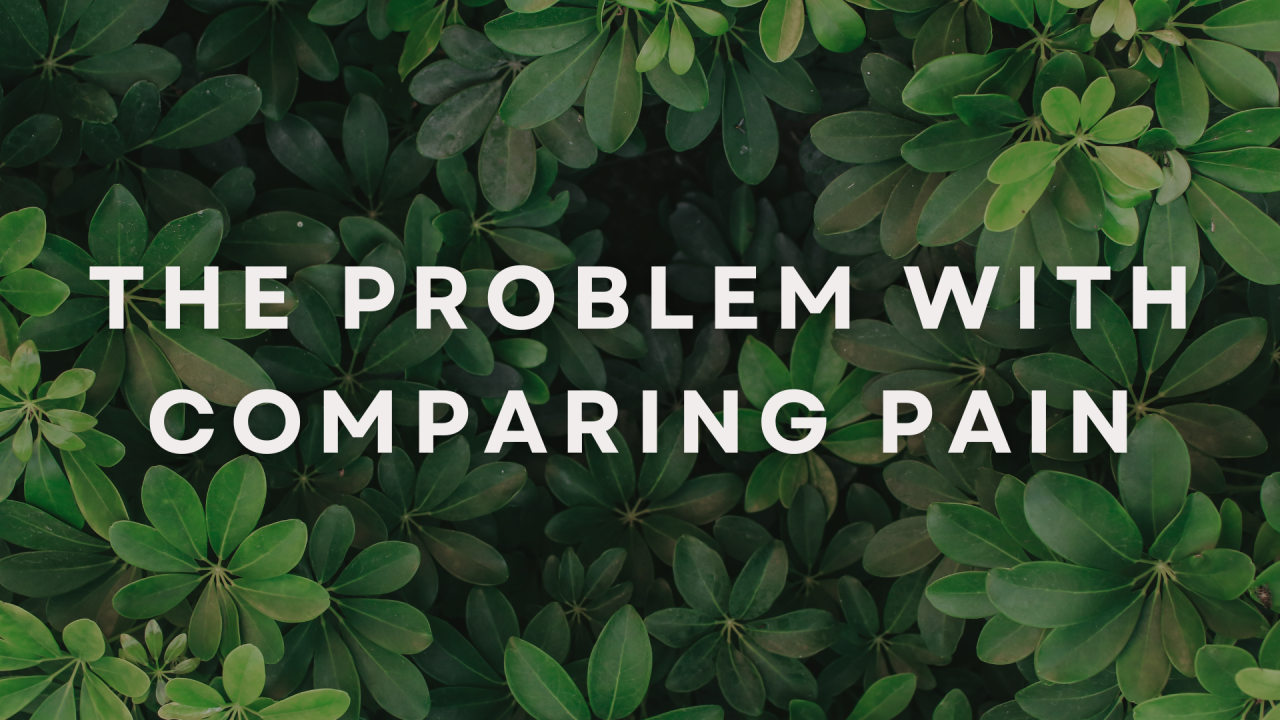The Problem with Comparing Pain: Healing from Religious Trauma
As a mental health counselor, I’ve encountered countless stories of emotional pain—some raw, some quiet, some so profound they ripple through every facet of a person’s life. One pattern I’ve noticed, is our tendency to compare pain—especially when it comes to dealing with our own traumas. Experiences like spiritual abuse, coercion, or shaming can leave deep emotional wounds that we hide from others, making it easy to minimize our suffering and consider others’ trauma as worse. Comparison of pain often plays out in two ways: we either minimize someone else’s pain, dismissing it as “not that bad,” or more often than not, we minimize our own pain, telling ourselves we have no right to feel the way we do because “others have it worse.” While this tendency might seem natural or logical, it often does more harm than good.
The Impact of Minimizing Our Own Pain
When we tell ourselves, “I shouldn’t feel this way because someone else has it worse,” we invalidate our own experience. Denying or downplaying our pain doesn’t resolve it; it buries it. Emotional pain, much like physical pain, demands attention. If ignored, it festers, often manifesting in anxiety, depression, or other mental health challenges.
Imagine breaking your arm but refusing to seek treatment because someone else has broken both arms. Does their greater injury negate your own pain? Of course not. Emotional wounds deserve care and compassion, no matter how “small” they might seem in comparison to others’ struggles. And in most cases, our wounds are rarely as “small” as we tell ourselves they are. Acknowledging and addressing your pain is not selfish; it’s essential for healing.
The Impact of Minimizing Others’ Pain
On the flip side, dismissing someone else’s pain as trivial or less important lacks empathy. Consider a teenager experiencing their first breakup. To an adult, this might seem insignificant compared to, say, the loss of a spouse. But to that teenager, the heartbreak is profound and consuming. Their emotional world, shaped by their experiences and developmental stage, may not have the same depth or breadth as an adult’s, but that doesn’t make their pain any less real.
When we minimize others’ pain, we risk alienating them. We send the message that their feelings don’t matter or that they’re overreacting. This not only deepens their pain but also erodes trust and connection. What if, instead of judging the validity of someone’s pain, we chose to meet them with compassion? Is it not our hope to soothe pain for others rather than increase it?
The Cost of Comparison
The problem with comparing pain is that it’s inherently flawed. Emotional pain is not a competition; it’s a personal experience. Two people can experience the same event—a job loss, for example—and react in entirely different ways based on their unique histories, coping mechanisms, and support systems. Pain is subjective, and no one’s experience can invalidate another’s.
Comparison also robs us of empathy. Empathy doesn’t require us to agree with or fully understand someone else’s feelings. It simply asks us to acknowledge them. By doing so, we create space for connection, healing, and growth.
A New Perspective
So how can we shift away from comparing pain? Start by validating emotions—both your own and others’. If you’re struggling, give yourself permission to feel. Instead of saying, “I shouldn’t feel this way because others have it worse,” try, “My feelings are valid, what I have experienced was difficult and I deserve compassion.” Similarly, when someone else is in pain, resist the urge to judge or dismiss their experience. Instead, try saying, “That sounds really hard. I’m here for you.”
Remember, pain doesn’t need to be ranked to be worthy of acknowledgment. No matter what has happened, pain deserves care. The goal is not to measure whose pain is greater but to support each other through life’s inevitable struggles.
Final Thoughts
The next time you catch yourself comparing pain, pause and reflect. What purpose does this comparison serve? Does it bring comfort, healing, or understanding? Or does it perpetuate judgment and disconnection? Instead of falling into the trap of comparison, choose empathy. Whether it’s for yourself or someone else, compassion is always the better path.
If you are interested in learning more about my counseling practice, click the button below to get started on your mental health journey.
